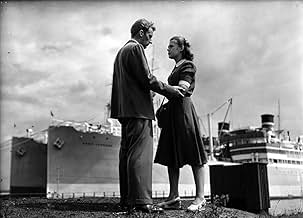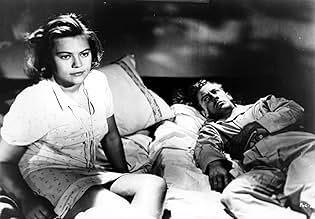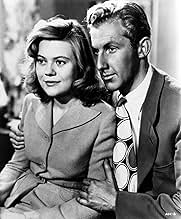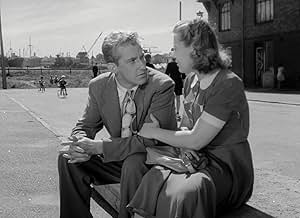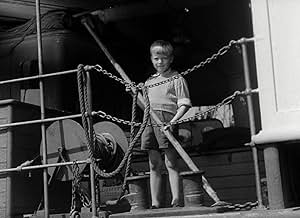AVALIAÇÃO DA IMDb
6,6/10
3 mil
SUA AVALIAÇÃO
Adicionar um enredo no seu idiomaA suicidal factory girl out of reformatory school, anxious to escape her overbearing mother, falls in love with a sailor who can't forgive her past.A suicidal factory girl out of reformatory school, anxious to escape her overbearing mother, falls in love with a sailor who can't forgive her past.A suicidal factory girl out of reformatory school, anxious to escape her overbearing mother, falls in love with a sailor who can't forgive her past.
- Direção
- Roteiristas
- Artistas
Edvard Danielsson
- Klockaren
- (cenas deletadas)
Carl Deurell
- Prästen
- (cenas deletadas)
Kolbjörn Knudsen
- En sjöman
- (cenas deletadas)
Gunnar Nielsen
- En herre (1)
- (cenas deletadas)
Avaliações em destaque
This is a very nice early Ingmar Bergman film, one that's well composed, touches on daring subjects, and has a gritty, neorealist feel to it. Via flashbacks and nonlinear storytelling, we gradually come to understand a troubled young woman (Nine-Christine Jönsson), who we first see jumping into the water in a suicide attempt. We see the difficulty of her growing up with parents who are in a bad marriage, and the profound impact this has on her life. We see teenage rebellion, and feelings of loneliness and depression. We see female sexuality for enjoyment and as a way of escaping reality, but then facing the double standard in society. And we see a black market abortion, with the film showing both the hypocrisy and the unfairness of these not being legal in Sweden in 1948, except for "socio-medicinal" grounds like the eugenic case it refers to. All of these things and some cool working class scenes on the docks and in a factory give the film a dark sense of realism.
The performance from Jönsson is excellent, and the role and her portrayal reminded me of Harriet Andersson from some of Bergman's films in the 1950's. She plays vulnerable, defiant, loving, and lonely all very well, and comes across as a feminist hero to me. Early on we see her deftly fend off the supervisor's creepy suggestions for a little payback after he's put in a good word for her, and she puts up with several crude things like that over the course of the film. We can see the potential and goodness in her character, but at the same time, she has to wear her reform school past like a scarlet letter, and has difficulties coping in a world that judges instead of empathizes with her. She has seen enough of the world and of men even at her young age to doubt her lover (Bengt Eklund) will stick around, and the scene the two have in the hotel room, interrupted by her friend (Mimi Nelson), is one of the film's best. The scene where she exchange slaps with her mother (Berta Hall) is also a good one.
The film's frank references to premarital sex, abortion, and a brief bit of nudity were all things American films would not touch for years, and just as important are its questioning of authority and social conventions. The film was only released in the UK after 10 years with an X rating, and only released in America in 1963 after Bergman had won 2 Oscars. There are some moments when the young director should have exercised restraint, such as when Jönsson writes 'lonely' on the mirror in lipstick, or when Eklund rages in an overwrought way in the company of a prostitute, but all in all, he's in fine form here. This is a good, meaty film on its own, and it's even more interesting because of where it stands in his oeuvre. Well worth seeing, and deserves a higher average rating.
The performance from Jönsson is excellent, and the role and her portrayal reminded me of Harriet Andersson from some of Bergman's films in the 1950's. She plays vulnerable, defiant, loving, and lonely all very well, and comes across as a feminist hero to me. Early on we see her deftly fend off the supervisor's creepy suggestions for a little payback after he's put in a good word for her, and she puts up with several crude things like that over the course of the film. We can see the potential and goodness in her character, but at the same time, she has to wear her reform school past like a scarlet letter, and has difficulties coping in a world that judges instead of empathizes with her. She has seen enough of the world and of men even at her young age to doubt her lover (Bengt Eklund) will stick around, and the scene the two have in the hotel room, interrupted by her friend (Mimi Nelson), is one of the film's best. The scene where she exchange slaps with her mother (Berta Hall) is also a good one.
The film's frank references to premarital sex, abortion, and a brief bit of nudity were all things American films would not touch for years, and just as important are its questioning of authority and social conventions. The film was only released in the UK after 10 years with an X rating, and only released in America in 1963 after Bergman had won 2 Oscars. There are some moments when the young director should have exercised restraint, such as when Jönsson writes 'lonely' on the mirror in lipstick, or when Eklund rages in an overwrought way in the company of a prostitute, but all in all, he's in fine form here. This is a good, meaty film on its own, and it's even more interesting because of where it stands in his oeuvre. Well worth seeing, and deserves a higher average rating.
Berit's been punished and reformed, by those so much better and informed, now she's open eyed, attempts suicide, just can't fit the ideal they want formed (girls just want to have fun).
Gosta won't go sailing anymore, seeks the sanctuary of being on the shore, he's met a nice lady, who's past's a bit shady, unsure if that's where he wants to moor (the lost soul who doesn't know what he wants).
You're not like us, so we're going to make you like us. The oppressive approaches to managing adolescents who don't subscribe to the images society demands and expects, magnificently performed and presented - makes you so happy you're alive today and not then.
Gosta won't go sailing anymore, seeks the sanctuary of being on the shore, he's met a nice lady, who's past's a bit shady, unsure if that's where he wants to moor (the lost soul who doesn't know what he wants).
You're not like us, so we're going to make you like us. The oppressive approaches to managing adolescents who don't subscribe to the images society demands and expects, magnificently performed and presented - makes you so happy you're alive today and not then.
After making it through many of the more well-known Ingmar Bergman films, I've turned my attention to early Bergman. This Ingmar Bergman retrospective has certainly been the one with the loosest viewing schedule, which isn't to the project's detriment. With a filmmaker like Ingmar Bergman, one with pronounced themes to his films, it is interesting to see how he carries out those themes in each period of his work. In his 1948 film, Port of Call, Bergman examined the intricacies of human existence through the eyes of a suicidal factory worker desperate to escape the weight of her overbearing mother. Starring Nine-Christine Jönsson and Bengt Eklund, Ingmar Bergman perfectly explores the struggle of living a life free of the strains of complicated human relationships and the prisons of our own minds that many are often unable to escape from.
Berit (Nine-Christine Jönsson) recently released from reformatory school following an attempted suicide, is back under the thumb of her manipulative and overbearing mother. She sees a way out when she meets Gösta, a man she is able to convince is the first one to experience her passions. Berit, unable to properly experience love, sees Gösta as, not only a way to break free from her mother's influence, but also to escape her laborious job at the factory. A marriage would also prove to Berit's social worker that Berit was establishing a stable foundation for herself and would be free from the threat of returning to the reformatory school. Her plans for freedom with Gösta are foiled, however, when he cannot forgive her past.
Family troubles, especially overbearing or neglectful parents are a constant theme in the films of Ingmar Bergman and apparently have been since his earliest features. The intricacies of familial disconnect are fascinating, and Bergman tunes into those intricacies in a way I have seldom seem from other filmmakers. One of my favorite aspects of Bergman films is how he illustrates the brokenness of people, and how that brokenness contributes to their inabilities to form successful relationships. I continue to be amazed how keenly Bergman tapped into the human spirit. Another mainstay in Bergman's filmography is how often he depicted people working jobs they don't like in order to maintain lives that were personally unfulfilling. Much like in Summer with Monika, our protagonists in Port of Call worked jobs that robbed them of their essential human fulfillment and left them in a constant state of emotional exhaustion. The only place to relieve the stresses of the world is in the cinema. The scene in which Berit has removed herself from every disappointment of existence when she is freely laughing in a crowded theatre was extraordinary. It reminded me of the scene in Louis Malle's Au revoir Les Enfants where the only place everyone was equal and could enjoy themselves was during a screening of Charlie Chaplin's The Immigrant. Cinema as an artistic medium has relieved the pressures of existence since its inception, and Ingmar Bergman films are no exception to this rule.
Berit (Nine-Christine Jönsson) recently released from reformatory school following an attempted suicide, is back under the thumb of her manipulative and overbearing mother. She sees a way out when she meets Gösta, a man she is able to convince is the first one to experience her passions. Berit, unable to properly experience love, sees Gösta as, not only a way to break free from her mother's influence, but also to escape her laborious job at the factory. A marriage would also prove to Berit's social worker that Berit was establishing a stable foundation for herself and would be free from the threat of returning to the reformatory school. Her plans for freedom with Gösta are foiled, however, when he cannot forgive her past.
Family troubles, especially overbearing or neglectful parents are a constant theme in the films of Ingmar Bergman and apparently have been since his earliest features. The intricacies of familial disconnect are fascinating, and Bergman tunes into those intricacies in a way I have seldom seem from other filmmakers. One of my favorite aspects of Bergman films is how he illustrates the brokenness of people, and how that brokenness contributes to their inabilities to form successful relationships. I continue to be amazed how keenly Bergman tapped into the human spirit. Another mainstay in Bergman's filmography is how often he depicted people working jobs they don't like in order to maintain lives that were personally unfulfilling. Much like in Summer with Monika, our protagonists in Port of Call worked jobs that robbed them of their essential human fulfillment and left them in a constant state of emotional exhaustion. The only place to relieve the stresses of the world is in the cinema. The scene in which Berit has removed herself from every disappointment of existence when she is freely laughing in a crowded theatre was extraordinary. It reminded me of the scene in Louis Malle's Au revoir Les Enfants where the only place everyone was equal and could enjoy themselves was during a screening of Charlie Chaplin's The Immigrant. Cinema as an artistic medium has relieved the pressures of existence since its inception, and Ingmar Bergman films are no exception to this rule.
6sol-
An early film from Ingmar Bergman, it is just as interesting on a visual scope as his films usually are, with the docklands filmed well and good use of panning and dolly work throughout. In terms of story and acting though, this is rather ordinary stuff, despite some interesting ideas and philosophies about freedom. It seems the easy way to out to just classify this film as interesting but not up to the standard that Bergman would later set, however I cannot think of much else to say here. It certainly is not as thought-provoking and intense as some of his later films, and for those not interested in Bergman or clever camera movement, I could easily imagine this piece coming across as boring.
While Gosta, a seaman, arrives in Gothenburg, a young girl, Berit, makes a suicide attempt in the city harbour. After saving her, a rather promising relationship seems to begin but much work needs to be done from both of them in order to be together.
In 1948, Ingmar Bergman seems already familiar with the themes that he will never stop examining throughout his career. He observes and studies human behavior in everyday circumstances, in an effort to get a glimpse of its roots. Berit is depressed, but her situation has a long story, starting from her childhood. Growing up with a mother that never cared for anything and anyone but herself and a father that had a problem hiding his temper, she ended up in a reform school and the implications are therefore predictable. Gosta has just finished working in the ships and he finds himself working in the docks of Gothenburg, despite his ambition for something bigger. They are both in the need of a clean start in their lives, carrying their burdens from the past on the left and their dreams for the future on the right.
When they first meet, they can't possibly imagine how similar they are. In fact, they seem incapable of realizing anything because of the wall they have built around them in order to protect themselves. But she desperately needs to free herself from her mother (who impersonates all of her past) and he desperately needs to find someone to relief him from his loneliness. So, they will fight through all the difficulties for these goals. Eventually, she will learn to have some faith in other people, he will learn to forgive and they will both learn to face the past.
This film also works on a political level as the story takes place among the dock workers struggling everyday just for the essentials. Bergman himself admits the influence that the Italian Neo-Realists had on him in his first films and Port of Call is a characteristic example. It is mostly shot on location and the work in cinematography is really admirable, the black and white photography and the camera movement is stunning and Bergman proves how talented he is when it comes to framing. The leading actors give notable performances, especially Nine-Christine Jonsson.
Overall, Port of Call is an interesting film, a typical example of the first period in Bergman's filmography that will reach its climax with "Summer with Monika". The story may sound clichéd and naïve at times, but it is its honesty that engages its viewers, as well as the masterful shots of the great Swedish director.
In 1948, Ingmar Bergman seems already familiar with the themes that he will never stop examining throughout his career. He observes and studies human behavior in everyday circumstances, in an effort to get a glimpse of its roots. Berit is depressed, but her situation has a long story, starting from her childhood. Growing up with a mother that never cared for anything and anyone but herself and a father that had a problem hiding his temper, she ended up in a reform school and the implications are therefore predictable. Gosta has just finished working in the ships and he finds himself working in the docks of Gothenburg, despite his ambition for something bigger. They are both in the need of a clean start in their lives, carrying their burdens from the past on the left and their dreams for the future on the right.
When they first meet, they can't possibly imagine how similar they are. In fact, they seem incapable of realizing anything because of the wall they have built around them in order to protect themselves. But she desperately needs to free herself from her mother (who impersonates all of her past) and he desperately needs to find someone to relief him from his loneliness. So, they will fight through all the difficulties for these goals. Eventually, she will learn to have some faith in other people, he will learn to forgive and they will both learn to face the past.
This film also works on a political level as the story takes place among the dock workers struggling everyday just for the essentials. Bergman himself admits the influence that the Italian Neo-Realists had on him in his first films and Port of Call is a characteristic example. It is mostly shot on location and the work in cinematography is really admirable, the black and white photography and the camera movement is stunning and Bergman proves how talented he is when it comes to framing. The leading actors give notable performances, especially Nine-Christine Jonsson.
Overall, Port of Call is an interesting film, a typical example of the first period in Bergman's filmography that will reach its climax with "Summer with Monika". The story may sound clichéd and naïve at times, but it is its honesty that engages its viewers, as well as the masterful shots of the great Swedish director.
Você sabia?
- CuriosidadesThe book which Gösta reads on his bed is 'Resor utan mål' ('Journeys Without Destination') by Swedish author and future Nobel laureate in Literature (1974) Harry Martinson. Martinson was, indeed, a sailor before becoming an author, and the book, published in 1932 as Martinson's first prose volume (his greatest fame would come for his poetry), was a document of his own experiences as one, written at twenty-eight after he had given up the sea due to a combination of lack of employment and a bout of tuberculosis. A sailor like Gösta would indeed have found much interest in the book, as it dealt realistically with the life of a sailor from his country living a life very similar to his own. The book itself has sadly never been published in English, but Martinson's second novel, 'Kap Farväl!', somewhat similar to 'Resor utan mål', was translated as 'Cape Farewell'. Director Ingmar Bergman was indeed an admirer of his countryman Martinson and, in 1964, he staged the premiere of Martinson's play 'Tre knivar från Wei' ('Three Knives From Wei'), although, unfortunately, he considered the production an unmitigated disaster.
- Erros de gravaçãoWhen the camera pans from Gösta to Skåningen in the whistling scene, an object which is probably a microphone can be seen briefly in the upper right frame.
- Citações
Gertrud's Father: She never gave me any joy. Perhaps it's turned out for the best.
- ConexõesFeatures Stackars lilla Sven (1947)
- Trilhas sonorasLa paloma
("A Dove")
Composed by Sebastian Iradier (1859)
Swedish text by Ernst Wallmark
Performed by Bengt Eklund
Principais escolhas
Faça login para avaliar e ver a lista de recomendações personalizadas
- How long is Port of Call?Fornecido pela Alexa
Detalhes
- Tempo de duração1 hora 40 minutos
- Cor
- Mixagem de som
- Proporção
- 1.37 : 1
Contribua para esta página
Sugerir uma alteração ou adicionar conteúdo ausente


